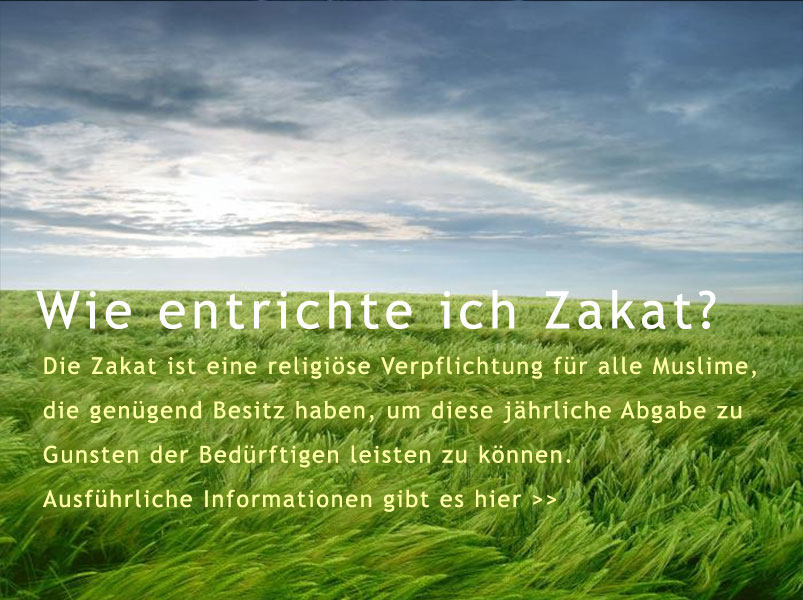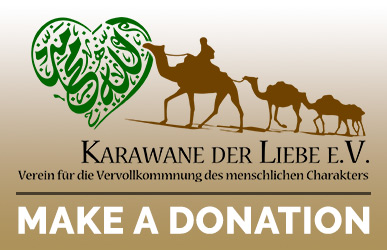General Zakat Information
What is Zakat ul-Fitr?

Zakat General Information
Zakat is a religious commitment to all Muslims who have enough assets to give zakat. The zakat payment is an important part of any Islamic community, as it promotes environmental and social security on one side and the sense of community between people on the other.
We also pass on your Zakat and Zakat ul Fitr!
- What is the difference between zakat and taxes?
While Zakat is a relationship between man and God, taxes are a purely secular affair between citizen and state. The Zakat is a worship service (Ibada) only for Muslims, but taxes are a civil obligation for both Muslims and non-Muslims.
- Whom is Zakat paid for?
Allah, the Blessed One says in the Holy Quran:
"Truly, the levies are for the poor and the needy, and for those entrusted with their administration, and for those whose hearts are to be gained, for the (liberation of) slaves and for the indebted, for those who struggle in the path of Allah, and for travelers; This is a commandment from Allah. And Allah is All-Knowing, All-Wise "
This blessed verse makes it clear to whom the zakat is to be paid:
- The poor (fuqarâ ')
Those who are not considered to possess anything, according to the religious guidelines e.g. Those woho don't posses any goods in the order of a Nisab. Such persons are allowed to accept Zakât, even if they have a job and a working capacity.
- The needy (masâkîn)
Those who do not have daily food, that are extremely poor.
- The Commissioners ('âmilîna 'alayhâ)
The ones charged with collecting the Zakât.
- Those whose hearts are to be won (mu'allafat qulûbuhum)
Those whose hearts are to be warmed for Islam.
- The slaves (fî r-riqâb)
Those who have made an agreement with their owners about their free rein from slavery.
- The indebted (ghārimîn)
Such persons whose debts exceed their possessions may also be given zakât.
- Who work for the cause of Allah (fî sabîliLlah)
Those who fight in the way of Allah, those who have gone on pilgrimage and became destitute on the way, those who acquire Allah's knowledge for the good of the people and the community of Islam in the way of Allah and those who mediate Islam to non-Muslims.
- Travelers (ibni sabīl)
Even though they should be wealthy in their home country, travelers who have run out of money on the journey may be paid zakât.
- How is Zakat paid?
The zakat can be paid in goods or in cash.
We also pass on your Zakat and Zakat ul Fitr:
Sufipfad der Liebe e.V.
IBAN: DE07 5209 0000 0116 1160 06 | BIC/Swift Code: GENODE51KS1
Volksbank Kassel Göttingen eG
Keyword/Reference: Leave EMPTY!!!
- Is there a deadline?
The Zakat obligation does not become time-barred and must therefore be paid retrospectively for all missed years. Since the zakat obligation does not extinguish with death, the zakat must be paid by the hereditary material before it is distributed to the heirs.
- Who is obligued to give Zakat?
- You have to be Muslim
Non-Muslims are not subject to the Zakat duty, since the Zakat is a purely Islamic liturgical act. However, non-Muslims in an Islamic society can benefit from the zakat.
- You have to reach puberty.
- You have to be sane.
For minors and the mentally handicapped, who have their own assets, the guardian (Wali) is obliged to pay the zakat in their place.
- For which assets does Zakat have to be paid?
Nisab is the minimum amount of assets a Muslim should have before his / her assets become liable to zakat. The Prophet Muhammad  has set this amount to the value of 20 Mithqal (about 85g of gold - about 2,651 euros, as of July 6, 2014) set. If a Muslim has a fortune of this amount at the beginning and end of a lunar year (one lunar year is ten days shorter than one solar year), he / she must give 2.5% of the accumulated money as Zakat. Debts are deducted from the assets and should be repaid as soon as possible.
has set this amount to the value of 20 Mithqal (about 85g of gold - about 2,651 euros, as of July 6, 2014) set. If a Muslim has a fortune of this amount at the beginning and end of a lunar year (one lunar year is ten days shorter than one solar year), he / she must give 2.5% of the accumulated money as Zakat. Debts are deducted from the assets and should be repaid as soon as possible.
- Self-employed businessmen
Traders should be able to determine the value of their trades at the beginning of the year based on their bookkeeping and deduct the outstanding debt from it. The Zakat is paid out of the net assets.
We also pass on your Zakat and Zakat ul Fitr!
What is Zakat ul-Fitr?
Zakat-ul-Fitr is a donation limited to the month of Ramadan and is significantly different from Zakat's general. The payment of this special Zakat, Zakat-ul-Fitr is compulsory for all Muslims (adults and children) and is considered as cleaning and compensation for miscarriages during the month of Ramadan. The amount of Zakat-ul Fitr is redefined each year for each country according to the purchasing power of the respective national currency. It is not based on personal assets, but is about the equivalent of a simple meal in each country. At the moment (2023) the Zakat-ul Fitr in Germany is 10, - Euro per person. Zakat-ul Fitr must be paid between the beginning of Ramadan and at the latest before id-prayer.
"Fitr" is fast-breaking, and "zakat-ul-fitr" or "sadaqat-ul-fitr" is a tax paid towards the end of the fasting month of Ramadan. The most important principles can be found in the following three traditions:
Ibn Abbas said: Allah's Messenger

has prescribed the "sadaqat-ul-fitr" as purification for the fasting of the worthless and the obscene, and as feeding for the poor. Who pays it before the prayer (of the feast), for whom it is supposed "zakat", and who pays it after prayer, for whom it is a "sadaqah" like others. "(Abu Dawud)
Ibn Umar said: "The Prophet

prescribed as" sadaqat-ul-fitr "a" sa? "Barley or dates to pay from young and old, free and unfree, husband and wife." (Abu Dawud)
Ibn Umar said: Allah's messenger

told us about "sadaqat-ul-fitr" to give it before people went to prayer. He said Abdullah bin Umar used to pay it a day or two earlier. (Abu Dawud)
Even though the religious scholars have different views regarding certain details, the following can be said for "zakat-ul-fitr":
Who fasts in Ramadan, also pays the "zakat-ul-fitr", unless he is self-needy.
For him, he cleans up certain shortcomings that have occurred to him during Lent, thus helping the poor at the same time.
At the time of the Prophet Muhammad

, the "zakat-ul-fitr" was given in the form of common foods. The measure of a "sa", used at the time of the Prophet Muhammad

corresponds to about 1100 grams. Even today, in many Muslim countries rice, grain or flour is distributed to the poor, but on the other hand the "zakat-ul-fitr" is also paid as money. If one takes in account the usual prices for foodstuffs in Germany today and would like to make it possible for the needy to have at least a modest feast on the day of breaking the fast, one should set an amount of 10, - Euro (as of 2023).
Whoever is eligible pays out of his own fortune. For children who do not have their own assets, the father is responsible. The wife, who has her own fortune, pays for herself, the husband does not have to, but may pay for her.
Although many Muslims pay the zakat-ul-fitr on the last day of fasting or even just before the celebration, it makes sense not to wait so long, especially if the recipients of this gift are not living in close proximity. For many years we have been offering the opportunity to pass on the "zakat u-l-fitr" to the needy. On the one hand, we see this as a service that we render to our donors, because we help them fulfill their religious duty. But on the other hand, it is also a significant help to the poor, in whose name we thank them. Also in this Ramadan, we intend to help and please people in need of zakat-ul-fitr. And the help is with Allah.
We also pass on your Zakat and Zakat ul Fitr!





 has set this amount to the value of 20 Mithqal (about 85g of gold - about 2,651 euros, as of July 6, 2014) set. If a Muslim has a fortune of this amount at the beginning and end of a lunar year (one lunar year is ten days shorter than one solar year), he / she must give 2.5% of the accumulated money as Zakat. Debts are deducted from the assets and should be repaid as soon as possible.
has set this amount to the value of 20 Mithqal (about 85g of gold - about 2,651 euros, as of July 6, 2014) set. If a Muslim has a fortune of this amount at the beginning and end of a lunar year (one lunar year is ten days shorter than one solar year), he / she must give 2.5% of the accumulated money as Zakat. Debts are deducted from the assets and should be repaid as soon as possible.